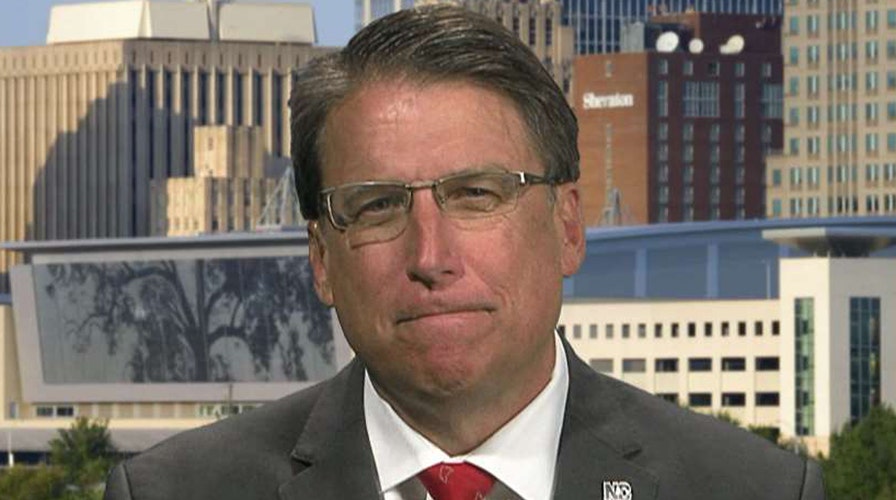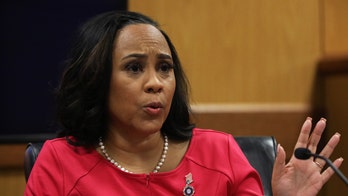Gov. McCrory opens up about North Carolina's governor's race
On 'Fox & Friends,' the governor on why the state could decide America's future
RALEIGH, N.C. – North Carolina's still-undecided governor's race could be drawn out further by a lawsuit that contends the state can't finish counting votes until it verifies the residency of thousands who used same-day registration.
A lawsuit filed Monday by the conservative-leaning Civitas Institute asks a federal court to require that the state Board of Elections refrain from certifying election results until it has finished verifying same-day registrants. It argues verification can't properly be finished until December.
The lawsuit revives a key argument from previous litigation over voter-access measures. A federal appeals court restored same-day registration earlier this year when it struck down parts of a wide-ranging elections law passed by the state's GOP-controlled legislature.
Also on Tuesday, Republican Gov. Pat McCrory began the process of asking for a recount even though votes are still being counted statewide.
The lawsuit and recount requests add to the uncertainty over the close race between McCrory and Democrat Roy Cooper, the state's outgoing attorney general. Cooper led Tuesday by about 6,300 votes, a tiny sliver of the 4.7 million total ballots, according to unofficial results.
Most counties are continuing their canvasses even though they were originally supposed to finish Friday. The counting has been slowed by factors including Republican-led challenges in counties across the state. Statewide results were scheduled for certification on Nov. 29, but state officials can delay that tally.
Now, the Civitas Institute argues that verification of same-day registrants must be complete before statewide certification can happen.
Certifying the results without double-checking those voters' addresses "violates North Carolina law because ballots will be counted without the voter registrations having been verified," the lawsuit states.
North Carolina law allows people to register and cast a ballot on the same day during early voting if they can show documents proving where they live.
The lawsuit says North Carolina law requires election officials to check registrants' addresses by sending them mail and seeing if it is deliverable. State elections board guidelines indicate 30 days should be allowed for the mailing process, so the lawsuit argues the overall tallying of votes can't be finished before December 7.
Same-day registration was restored in July when a federal appeals court ruled that parts of a 2013 elections law disproportionately targeted black voters, who tend to vote Democratic. The ruling also struck down a photo ID requirement for in-person voting, and it effectively lengthened the early-voting period.
Lawyers representing the state had noted the difficulty in verifying addresses of same-day registrants in a short time. The appeals court acknowledged that "those concerns are real," but restored the program.
An attorney for Cooper's campaign, Marc Elias, said the lawsuit is the latest effort by Republicans to undermine the results of an election that McCrory has already lost.
"Today's lawsuit by Civitas is just the latest effort to disenfranchise legally registered voters. Instead of attacking North Carolina voters and undermining our democratic process, Governor McCrory needs to accept his defeat and concede," Elias said in a news release.
Later Tuesday, McCrory's campaign said it filed for a recount. McCrory's campaign acknowledged the recount won't happen until counties finish their tallies, but they wanted to ensure they didn't miss a deadline under state law.
McCrory campaign manager Russell Peck said: "we must keep open the ability to allow the established recount process to ensure every legal vote is counted properly."
Counties were originally supposed to finish their counts by Friday. Recount requests must normally be filed by the second business day after those county reviews. In this race, a candidate trailing by fewer than 10,000 votes is entitled to a recount.
Cooper's campaign called the recount request "a last-ditch effort" to prolong the contest.
The state board also met Tuesday to formulate legal advice for local elections officials who are deciding whether to count ballots subject to the formal complaints across the state. The board advised counties to continue counting and that state officials could revisit the complaints if it appears that statewide results were affected.





